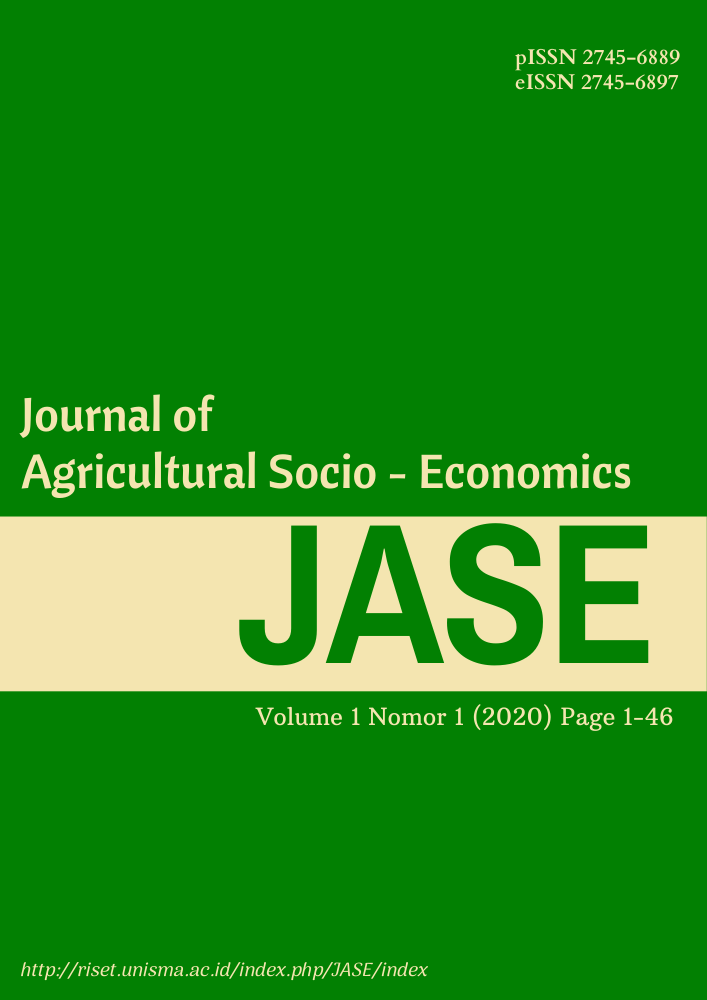Integration of Indonesian coffee markets and world coffee markets
DOI:
https://doi.org/10.33474/jase.v1i1.7153Keywords:
coffee, market integration, VAR/VECMAbstract
This study aims to analyze the integration of the Arabica and Robusta coffee markets in Indonesia and world coffee prices. The study uses secondary data in the form of annual time series data from 1985-2015. The study uses the VECM analysis method. This method explains the relationship between long-term dynamic and short-term equilibrium in a system of equations. The analysis shows that Indonesian and world Arabica coffee did not integrate into the long term or the short term. In Robusta coffee, VECM estimation shows that there is the significant at the 10% level in a long-term relationship with a value of 0.086. It means that there is a short-term relationship between world Robusta coffee prices and domestic Robusta coffee prices in the previous year, but no relationship in the long run.References
Anindita, R., & Baladina, N. (2017). Pemasaran produk pertanian. Penerbit. Andi. Yogyakarta.
Asosiasi Eksportir Kopi Indonesia. 2016. Konsumsi Kopi Domestik (ID): AEKI. http://www.aeki-aice.org/industri_kopi_aeki.html
Amiti, M., Redding, S. J., & Weinstein, D. E. (2019). The Impact of the 2018 Tariffs on Prices and Welfare. Journal of Economic Perspectives, 33(4), 187-210.
Atmadji, E., Priyadi, U., & Achiria, S. (2019). Perdagangan Kopi Vietnam Dan Indonesia Di Empat Negara Tujuan Ekspor Kopi Utama: Penerapan Model Constant Market Share. Jurnal Ilmu Ekonomi Dan Pembangunan, 19(1), 38–48.
Baffes, J., Kshirsagar, V., & Mitchell, D. (2019). What drives local food prices? Evidence from the Tanzanian maize market. The World Bank Economic Review, 33(1), 160-184.
Baulch, B. (1997). Transfer costs, spatial arbitrage, and testing for food market integration. American Journal of Agricultural Economics, 79(2), 477-487.
Bukenya, J. O. (2020). Market Integration in the Staple Food Derivatives Markets in Uganda. Journal of Food Distribution Research, 51(1).
Chai, J., Wei, Z., Hu, Y., Su, S., & Zhang, Z. G. (2019). Is China's natural gas market globally connected?. Energy Policy, 132, 940-949.
de Lima, L. M., de Pellegrini Elias, L., e Silva, M. M. C. D., da Silva, K. V., & Pacheco, A. S. V. (2020). Behavioral aspects of the coffee consumer in different countries: The case of Brazil. In Coffee Consumption and Industry Strategies in Brazil (pp. 321-341). Woodhead Publishing.
Fafchamps, M. (1992). Cash crop production, food price volatility, and rural market integration in the third world. American journal of agricultural economics, 74(1), 90-99.
Gardner, B. L., & Brooks, K. M. (1994). Food prices and market integration in Russia: 1992-93. American Journal of Agricultural Economics, 76(3), 641-646.
Grabs, J. (2020). Selling Sustainability Short?: The Private Governance of Labor and the Environment in the Coffee Sector. Cambridge University Press.
Hardianti, I. D. (2016). Upaya Brazil Untuk Mempertahankan Posisi Produsen Terbesar Dalam Pasar Kopi Global. Jurnal Universitas Airlangga, 186–196.
Hutabarat, B. (2016). Analisis Saling-Pengaruh Harga Kopi Indonesia dan Dunia. Jurnal Agro Ekonomi, 24(1), 21. https://doi.org/10.21082/jae.v24n1.2006.21-40
Jiang, Y., Jiang, C., Nie, H., & Mo, B. (2019). The time-varying linkages between global oil market and China's commodity sectors: Evidence from DCC-GJR-GARCH analyses. Energy, 166, 577-586.
Kustiari, R. (2016). Perkembangan Pasar Kopi Dunia dan Implikasinya bagi Indonesia. Forum Penelitian Agro Ekonomi, 25(1), 43. https://doi.org/10.21082/fae.v25n1.2007.43-55.
Lourenzani, A. E. B. S., Watanabe, K., Pigatto, G. A. S., & de Godoi Pereira, M. E. (2020). What fills your cup of coffee? The potential of geographical indication for family farmers’ market access. In Coffee Consumption and Industry Strategies in Brazil (pp. 149-165). Woodhead Publishing.
Masri, H. M. (2019). Evaluating post-harvest practices on the quality and safety of Kona coffee (Doctoral dissertation, Virginia Tech).
McCook, S. (2019). Coffee is not forever: a global history of the coffee leaf rust. Ohio University Press.
Meiri, A., Nurmalina, R., & Rifin, A. (2014). Analisis Perdagangan Kakao Indonesia di Pasar Internasional. 1(1), 29–40. https://doi.org/10.21082/jtidp.v4n1.2013.p39-46
Mercure, J. F., Paim, M. A., Bocquillon, P., Lindner, S., Salas, P., Martinelli, P., ... & Ribeiro, J. M. P. (2019). System complexity and policy integration challenges: the Brazilian Energy-Water-Food Nexus. Renewable and Sustainable Energy Reviews, 105, 230-243.
Ozturk, O. (2020). Market integration and spatial price transmission in grain markets of Turkey. Applied Economics, 52(18), 1936-1948.
Rapsomanikis, G., Hallam, D., & Conforti, P. (2006). Market integration and price transmission in selected food and cash crop markets of developing countries: review and applications. Agricultural Commodity Markets and Trade, 187-217.
Ravallion, M. (1986). Testing Market Integration. American Journal of Agricultural Economics, 68(1), 102–109. https://doi.org/10.2307/1241654
Sembiring, S. A., Harianto, Siregar, H., & Saragih, B. (2008). Dampak Kebijakan Pemerintah Melalui Instruksi Presiden Tahun 2005-2008. Forum Pascasarjana, 35(1), 15–24.
Smith, S. C., & Todaro, M. P. (2020). Economic Development, The Pearson Series in Economics 2011.
Susilowati, S. H. (2007). Dampak Kebijakan Ekonomi di Sektor Agroindustri terhadap Distribusi Pendapatan dan Kemiskinan di Indonesia. Thesis.
Torga, G. N., & Spers, E. E. (2020). Perspectives of global coffee demand. In Coffee Consumption and Industry Strategies in Brazil (pp. 21-49). Woodhead Publishing.
Van Campenhout, B. (2007). Modelling trends in food market integration: Method and an application to Tanzanian maize markets. Food policy, 32(1), 112-127.
Wahyudi, A., Wulandari, S., Aunillah, A., & Alouw, J. C. (2020, January). Sustainability certification as a pillar to promote Indonesian coffee competitiveness. In IOP Conference Series: Earth and Environmental Science (Vol. 418, No. 1, p. 012009). IOP Publishing.
Downloads
Published
How to Cite
Issue
Section
License
JASE: Journal of Agricultural Socio-Economics with a registration number of ISSN xxxx-xxxx (printed) and xxxx-xxxx(online) published by the Department of Agribusiness, Faculty of Agriculture at the University of Islam Malang by applying for copyright and License.
Copyright:
- Copyright in each text is the property of the author.
- The author agrees that JASE has the right to the first license issued with a Creative Commons Attributions-ShareAlike 4.0 International License.
- The author can write the article separately through non-exclusive distribution with other versions related to the article that was first published in the JASE : Journal of Agricultural Socio-Economics.
Licence:
- Attribution: You must give appropriate credit, provide a link to the license, and indicate if changes were made. You may do so in any reasonable manner, but not in any way that suggests the licensor endorses you or your use.
- ShareAlike: If you remix, transform, or build upon the material, you must distribute your contributions under the same license as the original.
- No additional restrictions: You may not apply legal terms or technological measures that legally restrict others from doing anything the license permits.
You are accessible to:
- Share a copy and redistribute this material in any form or format.
- Change and make derivatives of this material for any purpose, including commercial interests.
- The licensor cannot revoke the above conditions as long as the authors comply with the terms of this license.
Â

This work is licensed under a Creative Commons Attribution-ShareAlike 4.0 International License.








_-_Copy.jpg)

